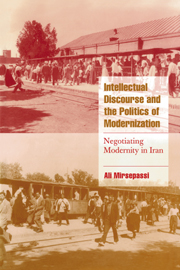Book contents
- Frontmatter
- Contents
- Acknowledgments
- Introduction: modernity and “culture”
- 1 Western narratives of modernity
- 2 Reconciling with the West's Other
- 3 The crisis of secularism and the rise of political Islam
- 4 Islam as a modernizing ideology: Al-e Ahmad and Shari'ati
- 5 German intellectuals and the culture of modernity
- 6 The tragedy of the Iranian Left
- 7 Modernities of our time
- Notes
- Bibliography
- Index
2 - Reconciling with the West's Other
Published online by Cambridge University Press: 06 October 2009
- Frontmatter
- Contents
- Acknowledgments
- Introduction: modernity and “culture”
- 1 Western narratives of modernity
- 2 Reconciling with the West's Other
- 3 The crisis of secularism and the rise of political Islam
- 4 Islam as a modernizing ideology: Al-e Ahmad and Shari'ati
- 5 German intellectuals and the culture of modernity
- 6 The tragedy of the Iranian Left
- 7 Modernities of our time
- Notes
- Bibliography
- Index
Summary
In the opinion of the writer of these lines that which is today in the highest degree necessary for Persia, which all patriotic Persians should exert themselves to promote, literally, with all their strength, and should place before everything else, is threefold:
First, the adaptation and promotion, without condition or reservation, of European civilization, absolute submission to Europe, and the assimilation of the culture, customs, practices, organization, sciences, arts, life, and the whole attitude of Europe, without any exception save language; and the putting aside of every kind of self-satisfaction, and such senseless objections as arise from a mistaken, or, as we prefer to call it, a false patriotism …
Hasan TaqizadehIntroduction
Much of the scholarship on the social history of modern Iran is modeled after a perceived European narrative of progress. Many Iranian historians have attempted to write a narrative of “progress” in the Iranian setting. This genre of historiography renders the struggle between “tradition” and “modernity,” positing the eventual victory of modern ideas, institutions, and personalities over local customs, outlooks, and cultural habits. A grand narrative of progress in this vein leaves little room for those ideas, institutions, intellectuals, and processes which function as a bridge between the local and the global, tradition and change.
Ideas, institutions, and social tensions are often portrayed as sites of the struggle between traditional impulses and modern desires. Intellectuals are equally subject to such “either/or” classification, and their ideas and dispositions too often defined in terms of traditional (Islamic, feudal, backward, local) or modern (cosmopolitan, Western-secular, progressive). Complexities and ambiguities are glossed over as traditional/modernist boundaries are constructed and installed.
- Type
- Chapter
- Information
- Intellectual Discourse and the Politics of ModernizationNegotiating Modernity in Iran, pp. 54 - 64Publisher: Cambridge University PressPrint publication year: 2000

